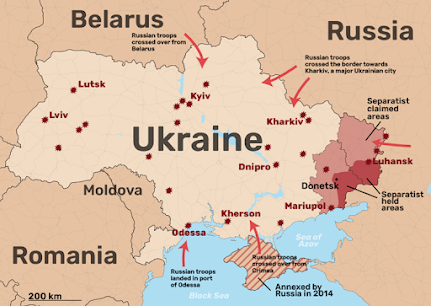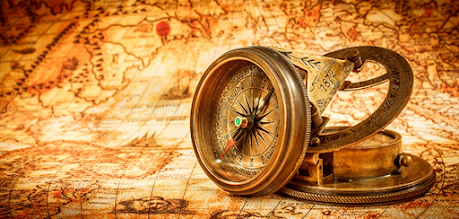India’s Stance on the ongoing Ukraine Conflict
· The
origins
During the Cold War, India and the Soviet Union (USSR)
had a strong strategic, military, economic and diplomatic relationship. After
the dissolution
of the Soviet Union, Russia inherited
its close relationship with India which resulted in both nations sharing
a special relationship. Russia and India both term this relationship
as a "special and privileged strategic partnership".
Throughout the course
of independent India’s history, The USSR has been India’s strongest pillar both
in the international as well as in the domestic theatre. On the international
stage The Soviet Union steadfastly backed India’s stance on the Kashmir issue,
the Bangladesh Liberation War and India’s peaceful nuclear tests. Even after
the disintegration of The Soviet Union, Russia continued the role of being
India’s elder brother; if there ever has been.
Traditionally, the
Indo-Russian strategic partnership has been built on five major components: politics, defence, civil
nuclear energy, anti-terrorism
co-operation and space. In recent years a sixth, economic component
has grown in importance.
Ukraine has been
positively co-operating with India at the international level as well. Ukraine
supports the resolution of the issue of Jammu & Kashmir on the basis of Simla agreement. Ukraine also supports reforms of the UN structure. There is also a presence of a
vibrant Indian diaspora in Ukraine mainly comprising of students and business professionals.
There have also been
notable instances where Ukraine was involved in decisions which weren’t in
favour of India. We have the 1998 nuclear tests condemnation, the UN
intervention on the article 370A Kashmir bill and the sale of military equipment
to Pakistan worth 650 million dollars.
·
T The
Conflict
Russia invaded Ukraine on
24 February 2022. Internationally considered a war of
aggression, the invasion is the largest conventional military attack on a
European state since World War II. The invasion was a major escalation of
the ongoing Russo-Ukrainian conflict that began in 2014. This
conflict began with the 2014 Ukrainian Revolution of Dignity,
when Russia annexed Crimea, and Russian-backed
separatists seized part of south-east Ukraine, starting the war in
Donbas. In 2021, Russia began a large military build-up along
its border with Ukraine, amassing up to 190,000 troops along with their
equipment.
Russian president Vladimir Putin questioned Ukraine's right to statehood, and falsely accused Ukraine of being
dominated by neo-Nazis who persecute the Russian-speaking minority. Putin said the North Atlantic Treaty Organization (NATO) had threatened Russia's security
by expanding eastward since the early 2000s – a claim disputed
by NATO– and demanded Ukraine be barred from ever joining the alliance. The
United States and others accused Russia of planning to attack or invade
Ukraine, which Russian officials repeatedly denied as late as 23 February 2022.
The invasion began on
the morning of 24 February, when Putin announced a "special military
operation" to "demilitarise and de-nazify" Ukraine. Minutes
later, missiles and airstrikes struck throughout Ukraine, including the
capital Kyiv, shortly followed by a large ground invasion
from multiple directions. In response, Ukrainian president Volodymyr Zelenskyy enacted martial law and general mobilisation.
·
Indian
Response to the conflict
Prime Minister Narendra Modi appealed for an immediate cessation of
violence in Ukraine in a phone call to Putin on 24 February. He also spoke with
Zelenskyy on the 26th without ascribing responsibility for the violence. Modi has raised concern for the safe exit
and return of 18,000 Indian students in Ukraine. The Indian government has
refrained from taking a stand on the issue.
Earlier that day,
the Ministry
of External Affairs had
announced that "India is closely following the development of events in
the region". India is also considering setting up a mechanism to trade
with Russia using rupees to
avoid the effects of sanctions on trade between the two countries. Russia
provides about 70% of Indian arms and has had close relations since the Cold War.
India was the only member of the Quadrilateral Security Dialogue (QUAD) not to ban Russian exports.
·
![]() On which side should India sway, the Russian or the
NATO way?
On which side should India sway, the Russian or the
NATO way?
India’s reluctance to publicly criticize Russian President
Vladimir Putin’s all-out war on Ukraine has surprised many observers. Alongside
34 other countries, including China and also the United
Arab Emirates, India abstained from the vote on the recent United Nations Security
Council resolution condemning the Russian invasion. In stressing
the importance of “the UN Charter, international law, and respect for the
sovereignty and territorial integrity of states”, India’s UN representative, TS
Trimurti, signalled indirect disapproval of Moscow’s actions – but this wasn't enough to satisfy the West’s need for a transparent position from India.
There seems to be no room for important
geopolitical players to remain silent. The world’s largest democracy may be a key pillar of the United States’
Indo-Pacific policy and features heavily within
the European Union’s plans for increased engagement within the region. So, the EU and its allies are
placing India under considerable pressure to
talk up.
But instead of questioning India’s position as a
like-minded partner – and with it, the stronger EU-India relations of the last
two years – the union should do more to demonstrate its commitment to deeper
cooperation with the country. Indeed, it's within the EU’s interest to
point it out to India that it's a
reliable partner.
Indian administration said
that state-controlled Indian Oil Corp. had reached a deal to purchase 3 million barrels of oil from Russia’s
Rosneft Oil Co. at a 20% discount to global prices. This is a drop in the ocean of India’s oil needs, which stood
at 4.5 million barrels each day in January.
Still, if a payment system in rupees is figured
out that insulates the transaction from sanctions placed on
Russia, far more could follow.
The United States isn’t happy. White House
spokesperson Jen Psaki said India should worry about how it'll feature within
the history books when the story of the Ukraine invasion is
written. If this one deal results in more, you must expect questions
about whether the West has reposed an
excessive amount of faith in India.
Yet India has equal cause to wonder if it’s
placed an excessive amount of faith in the West.
Even as Europe and the U.S. congratulate themselves on the speed and
effectiveness of their sanctions against Russia, they
appear to be blind to the impact of
those sanctions on the remainder of the world.
To India and many other developing countries,
Western powers and the institutions they dominate appear to have different
standards for conflicts close to home. While the world Bank
has been slow to deal with the concerns of
other war-torn nations, it has put
together a $700 million package for Ukraine in record time. Some economists say
the International monetary fund could also be skirting its norms to send $1.4 billion
in emergency funding to Ukraine.
Meanwhile, those same Western
nations are proving themselves poor stewards of the
worldwide commons. Take the cut-off of several Russian banks from
the SWIFT financial messaging system. We have grown familiar
with thinking of interbank communications as a worldwide utility; they’ve now been turned into a tool of Western foreign policy. This
was a unilateral decision by the countries that control SWIFT which, besides
the U.S. and Japan, are all European.
Little thought was given to how countries like India, which are
dependent on SWIFT to purchase oil
and fertilizers from Russia, would manage the fallout. It should come as no
surprise that India’s reaction has been to look for a way around the sanctions
by settling trade with Russia in rupees and roubles.
Criticizing India for continuing to buy oil from Russia is
particularly galling, provided those
European nations have yet to wean themselves off Russian energy supplies
either. And, unlike them, India can
hardly afford such bills. If oil remains above $70 a barrel for months, the
rupee will collapse, the govt. will run
out of spending money, inflation will
skyrocket and thus the country will have
to start worrying about a balance of
payments crisis.
We have lived through this
kind of disruption at least twice
before, in 1991 and 2012. Yet our supposed partners in
the West don't seem to acknowledge that avoiding another one is a major national priority. Apart from this,
they don’t seem to appreciate how hypocritical
their talk about sanctions can appear. The
U.S. spent most of the last decade trying to convince India to not buy Iranian oil, only to try to get Iranian
shipments back on the market as soon as the focus shifted to Russia. While
the U.S. and Europe expect other countries to bear the price of sanctions, they’re too timid even to
send Polish fighter jets to Ukraine.
Moreover, in the long-term, India fears that
sanctions will push Russia ever closer to China and expand Beijing’s control
over the global economy. If some in the West worry that India is not lining up
on their side, then it should be known that many Indians worry as well that
the West’s notion of “their side” doesn't include
India.
India’s policy so far has served the national interest well
and achieved the status of a swing state. India now is too costly to be lost as
an ally on the international stage. This is the result of decades of
consistency in our foreign policy which doesn’t align with any hegemon, rather
it aligns solely with the interests of the Indian populace. India today enjoys
a privileged partnership with Russia as well as with the west. There was a time
when India was isolated and The USSR was the only reliable ally India ever had;
now when the circumstances have changed the least India can do is
abstain and refrain from condemning Russia.
But geopolitics and international relations do not function
on the mechanisms of morality and emotions, they work majorly on the mechanism
of self-interest. So, answering the question on which way should India sway;
India should sway on its own way, neither the Russian nor the American, but its
own, as it always had no matter whether there was one ally or there are
multiple allies.
Credits and References:
Riddhijit Basu SY Electrical (Team Thursday Awareness)
https://en.m.wikipedia.org/wiki/Russo-Ukrainian_War
NOTE:-
This blog is meant for Educational purposes only. We do not own any Copyrights related to images and information, all the rights go to their respective owners. The sole purpose of this blog is to Educate, Inspire, and Empower and to create awareness in the viewers. The usage is non-commercial (Not for Profit) and we do not make any money from it.
Write your Feedback here:
https://forms.gle/C3ybXMPPUaJBgP618
FOLLOW US ON:-
INSTAGRAM:
https://bit.ly/coep_blogs_insta
LINKEDIN:
https://bit.ly/coep_blogs_linkedIn
YOUTUBE:-




Comments
Post a Comment